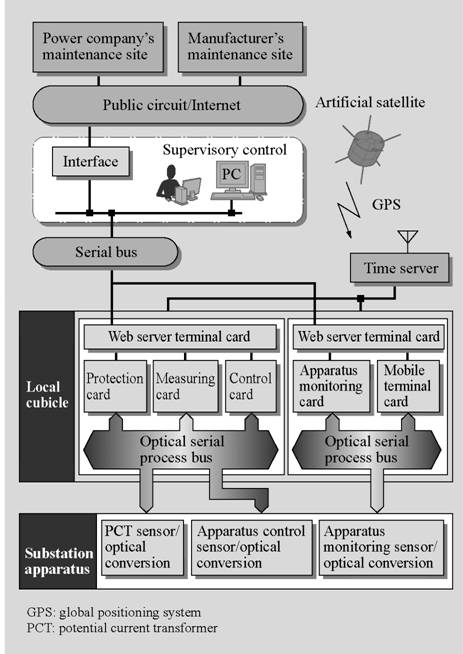





Published on Jan 09, 2026
Recently, due to concerns about the liberalization of electricity supply, deregulation, and global impact on the environment, securing a reliable power supply has become an important social need worldwide. To ensure this need is fulfilled, detailed investigations and developments are in progress on power distribution systems and the monitoring of apparatus.
These are on
(1) “digital technology” based on the application of semiconductor high-speed elements,
(2) intelligent substations applying IT (information technology), and
(3) system configurations aimed at high-speed communication.
Incorporated in these are demands for the future intelligent control of substations, protection, monitoring, and communication systems that have advantages in terms of high performance, functional distribution, information-sharing and integrated power distribution management. Today’s conventional apparatus also requires streamlining of functions, improvements in sensor technology, and standardized interfaces.
By promoting these developments, the following savings for the whole system can be expected:
(1) reduced costs in remote surveillance in the field of apparatus monitoring, operation, and maintenance,
(2) reduced maintenance costs based on the integrated management of equipment, and
(3) reduced costs due to space saving as a result of miniaturizing equipment
In conventional substations, substation apparatus, such as switchgear and transformer, control, protection and monitoring equipment is independent of every other device, and connection is based on the signals coming through the cable. On the other hand, an intelligent substation shares all information on apparatus, control, protection, measurement and apparatus monitoring equipment through one bus by applying both “digital technology” and “IT-related technology.”
Moreover, high efficiency and miniaturization can be achieved because the local cubicle contains unified control/protection and measurement equipment that is one integrated system (see Fig. 1). Since an optical bus shares the information between the apparatus and equipment, the amount of cable is sharply reduced. Moreover, as international standards (IEC 61850 and 61375 etc.) are adopted and the system conforms to the telecommunications standard, equipment specifications can be standardized for different vendors.
All the data from each monitoring and measuring device is transmitted and used for a higher-level monitoring system via an optical bus. The required data is accessed through the Intranet or the Internet at the maintenance site of an electricity supply company or a manufacturer and the apparatus can be monitored from a remote location. The construction, analysis and diagnosis of the database including trend management and history management also become possible. As a result, signs of abnormalities can be checked out well in advance, and prompt action can be taken in times of emergency.
Maintenance plans can also be drafted to ensure reliability, by inspecting revision description and parts management, efficient maintenance planning and reliability maintenance are also realized simultaneously.

Power system controls can be broadly classified into two categories: local and area (regional/system-wide). The boundary between these two categories is not precise as area controls are often implemented by optimally adjusting local control parameters and set points. Area controls main characteristic is the need to process information gathered at various points of the network and to model the behavior of large parts of the power system.
This type of control is usually not limited to the automatic feedback type but often includes strategies based on empirical knowledge and human intervention. Local control, on the other hand, is typically implemented using conventional automatic control rules, such as, PID control, which are believed to offer adequate performance in most applications. Still, this is not to discount the usefulness of new intelligent methodologies, such as, fuzzy logic controllers, for local controls.
For convenience, power system higher level controls are classified here as:
• Generation scheduling and automatic control: includes unit commitment, economic dispatch, and automatic generation control; in the past, well established control methods were used but this situation has been changing to deal with the new scenario created by the power industry restructuring;
• Voltage control: is mostly of the local type but some systems have already gone to a higher coordinated secondary control to allow a more effective use of reactive power sources and increase stability margins;
• Preventive security control: has the objective to detect insecure operating points and to suggest corrective actions; the grand challenges in this area are on-line Dynamic and Voltage Security Assessment (DSA and VSA);
• Emergency control: manages the problem of controlling the system after a large disturbance; it is an event driven type of control and includes special protection schemes;
• Restorative control: its main function is to re-energize the system after a major disturbance followed by a partial or total blackout.
Intelligent system techniques may be of great help in the implementation of area power system controls. Most of these applications require large quantities of system information, which can be provided by modern telecommunications and computing technology, but require new processing techniques able to extract salient information from these large sets of raw data. Importantly, such large data sets are never error free and often contain various types of uncertainty. Finally, control actions may be based on operating strategies specified in qualitative form, which need to be translated into quantitative decisions
| Are you interested in this topic.Then mail to us immediately to get the full report.
email :- contactv2@gmail.com |